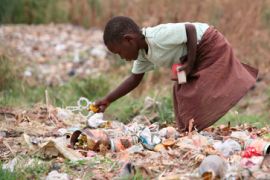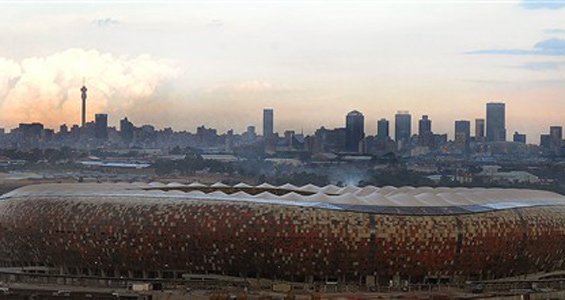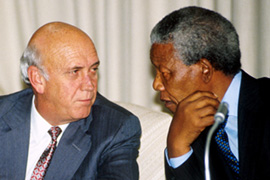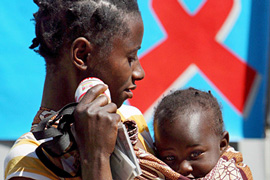Many still poor in South Africa
Despite political freedoms, poverty and Aids continue to plague the black majority.

 |
| Soweto Soccer City Stadium in Soweto, South Africa will be one of 10 stadiums to host the World Cup football tournament in June 2010 [EPA] |
South Africa remains a country of contrasts and a nation with two economies; Thabo Mbeki, the former president, once described the two economies as “one white and the other black”.
During the political negotiations which led to the first democratic elections in 1994, the African National Congress (ANC) agreed with the white minority ruling National Party to include a “Sunset Clause” in the new constitution.
The sunset clause was introduced principally to provide the white minority with reassurances as the country peacefully moved from Apartheid rule to a democracy. Consequently the prospect of violent future backlashes from the black majority against the white minority was averted.
The clause also managed to contain the economic conditions most South Africans find themselves in today – the white minority remains by and large rich and educated and the black majority are poor and illiterate.
National reconciliation
 |
| Mandela, right, introduced the Rainbow Clause, which shielded whites from a backlash [EPA] |
After Nelson Mandela won the elections in 1994, he enacted the Truth and Reconciliation Commission (TRC) and, in a bid to encourage the process, personally embarked on a racial reconciliation spree.
He visited old foes in their homes, dined with his jailers and visited the widow of Hendrik Verwoerd, the man dubbed “the father of apartheid”.
The TRC was set up by the Government of National Unity to help the nation recover from the prejudice and racism that existed during Apartheid.
This process gave mainly white members of the public a chance to express regret at failing to prevent human rights violations and to demonstrate their commitment to reconciliation. Amnesty was given to those who confessed to having committed crimes under Apartheid and showed remorse, thereby escaping future criminal charges.
After the first democratic elections and the demonstration of the above reconciliation overtures, South Africa began to attract investments from companies who had once divested in solidarity with the black majority during Apartheid.
Out of isolation
Furthermore, in a gesture of confidence by the international community, South Africa hosted important international conferences and sports tournaments. In 1995, South Africa hosted the International Rugby Board (IRB) World Cup, which it went on to win.
That was followed by the International Cricket Council (ICC) World Cup in 2003.
Beyond the realm of sports, however, South Africa hosted the World Conference on Racism and Xenophobia in 2001. A year later environmental activists and politicians gathered in South Africa for the World Summit on Sustainable Development. In June this year, South Africa will be hosting the FIFA World Cup.
But in tandem with these developments, new social movements began to emerge in the country, largely borne of frustration at the failure of the state to deliver services such as housing, water and sanitation.
Most of these movements blamed the government for embracing neo-liberal economics at the expense of the poor. The new social movements also accused the government of dragging its feet in rolling out antiretroviral (ARV) drugs to those suffering and affected by HIV/Aids.
The HIV/Aids debacle
 |
| According to an Aids charity, nearly 33 per cent of South African women have HIV [EPA] |
The accusations and suspicions levelled against the government for failing to deliver services were further exacerbated by Thabo Mbeki’s rhetoric on the causes of HIV/Aids.
Mbeki created national confusion and invited international condemnation after questioning the link between HIV and Aids. His health minister at the time even recommended the consumption of vegetables, garlic and beetroot to combat the virus and empower the immune system.
Further damaging to the government were allegations made in 2005 that Jacob Zuma, the then deputy president of the ANC, had raped an HIV positive activist. Zuma was acquitted of the charges but admitted to having sex without a condom.
According to Avert, an international AIDS charity, South Africa has the highest number of people living with HIV in the world: almost one in three women aged 25-29 and over a quarter of men aged 30-34 are living with HIV in South Africa.
A stable democracy
There have certainly been many changes in South Africa since Nelson Mandela was freed after spending 27 years in prison. Apartheid, which had been official state policy, was replaced by arguably the most liberal constitution in the world.
Although the government has since 1994 adopted policies to address the economic discrepancies prevalent under Apartheid, many in the black majority say they have yet to benefit from the changes.
Politicians – particularly at the local government level – have failed to deliver important services. Many people 20 years after Mandela’s release remain in shanty towns plagued by disease.
The promise of a prosperous rainbow nation announced by Mandela hours after his release from prison in 1990 remains a dream to many people in South Africa. The unemployment rate remains high and crime levels continue to affect investors’ appetite.
Notwithstanding all these challenges, South Africa remains Africa’s economic powerhouse, leading the continent in industrial output and mineral production, and generating a large proportion of Africa’s electricity.
South Africa has held three democratic elections over the past 14 years which were declared by all participating parties and international observers free and fair. In that time, it has seen the swearing in of four presidents.
Many democratic platforms were introduced and entrenched within society. The establishment of the Constitutional court meant that citizens had a means to report constitutional violations. Civil society is vibrant and active and press freedoms are well-entrenched.